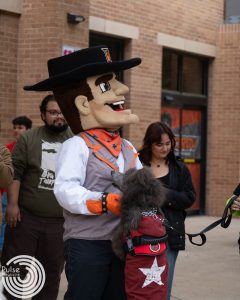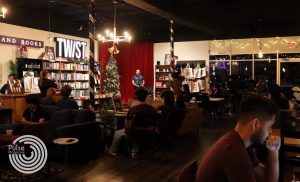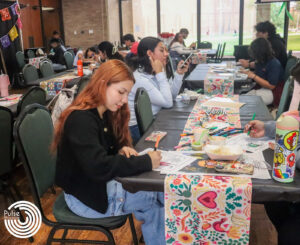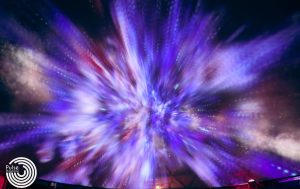El Último Año
La Sirena bar is one block down the gravel road from the Brownsville shrimp basin. A boat graveyard stretches between the basin and the bar. A Mexican flag droops on the bar’s roof. At the bar’s entrance sits a wooden mermaid. The bar owner, Nicasio de Leon, salvaged it from a muddy road in Linares, Nuevo Leon, Mexico. Linares was his birthplace and area of upbringing. He illegally entered the United States in his early 20s and found work in the Brownsville Shrimp Basin, where he shrimped the Gulf of Mexico for decades. Pedro, the old captain who came to love him like a son and mentored him until his death at sea at 100, sold him his first shrimp trawler at a discounted price. Nicasio renamed the trawler El Último Año from The Immortal. The profits from decades of shrimp fishery allowed Nicasio to purchase a second trawler, El Huerco, and become a naturalized U.S. citizen. Due to Nicasio’s advanced age, rising fuel prices, and the growth of farm-raised crustaceans and imported shrimp, he sold El Huerco and purchased La Sirena. It was an abandoned shrimp outlet and Nicasio remodeled the structure and turned it into a bar. The remodeling took years. After the bar was completed, he stopped shrimping at his wife’s request.
La Corrida ends after two short months. Two shrimpers drink at the bar, their faces etched with defeat. Hurricane Dolly approaches the Mexican Gulf, and more shrimp trawlers will reach the basin through the ship channel.
Willy enters the bar in a cigarette-smoke cloud. The two shrimpers raise their mugs and remove their hats as a gesture of respect.
“Look who’s here,” the shrimper with a cigar between his teeth says. “It’s none other than the legendary Crazy Willy! The finest South Texas shrimper of the last three generations!”
“You look like the president of the United States, Willy,” the shrimper in shades says and laughs. “Nicasio, Willy’s first beer is on us! For our mentor and the great legend! For Willy!”
“For Willy!” Everyone, including Nicasio, shouts. “For the legend. Que viva Willy!” The shrimpers raise their mugs again and toast.
Willy struts into the bar with his head raised high. The incoming dark clouds and rain don’t worry him. Today, he isn’t his typical self. He wears a pressed, spotless black suit and smells of cheap cologne and deodorant. For Nicasio’s wedding, he donned the suit. Nicasio recognizes it from the Polaroid photograph on the wall next to the shelf with the variety of empty liquor bottles drunk during La Sirena’s inauguration.
Willy’s hair is brushed back in a profuse sheen of brilliantine. His shoes are old and tattered, yet polished. His long, white beard has been untrimmed for years. Nicasio serves him the beer when he joins the shrimpers at the bar. Willy’s breath has a stench of liquor as he speaks. He drinks on credit and pays his bill to La Sirena with upkeep. He paid a beer debt last Christmas by repainting La Sirena’s restrooms.
“Did you know it’s my birthday today?” Willy announces.
“Is it?” Nicasio asks.
“Absolutely. September twe-…”
“Last Monday was your birthday, too,” Nicasio interrupts him.
“Yes, but that was last Monday. I’m celebrating next year’s.”
“Will you be back next week to celebrate the year after?”
“I will be back after the storm, God willing. I need to get ahead. How often do you see someone celebrate four birthdays in a month?”
“I envy you,” Nicasio says, wiping the inside of the mug with a piece of old newspaper. “What age do you want to reach this month?”
“One hundred.”
“One hundred? You’re not that old.”
“A man can’t live forever,” Willy says. “I will celebrate as many birthdays as I can. Have you ever met someone that lived thirty years in one month?”
“No. Never. Not even a dog lives 30 years in one month.”
“You should take a picture of me and display it on the wall. I will be like a hurricane in December. You may never meet someone like me in the remaining years of your life. My name should be in the Bible. Humanity owes me that award as a tribute to my standing as the finest shrimper. My sea stories will guide people like the North Star.”
Nicasio takes out the polaroid camera. Willy stands up and examines his image in the Budweiser sign mirror. He readjusts the suit’s collar and fixes his hair. Then he poses beneath the El Último Año’s old helm. The camera’s rapid flash illuminates the bar, causing Willy to squint.
The Polaroid then ejects the photograph, and Nicasio pins it next to his late wife’s portrait, where she waves goodbye from the top of the Port Isabel lighthouse.
Willy drinks five more beers. He studies the photographs on the wall. For many years, Willy and Nicasio shrimped together aboard El Último Año. Willy never worked for another captain after Nicasio retired. The rest of the crew did.
“Do you remember this moment, Nicasio?” Willy says, pointing at the wall. “Remember this rookie whose stomach never settled, and we had to drop him off in Corpus Christi?” He continues to point out each photograph. “Remember these speeding dolphins on the side of the boat? Remember these Coast Guards? The sons of bitches dumped our flounders into the ocean when they caught us cooking them. That blonde one said we were fishing illegally and violating the law. He was the worst. He put three flounders into a plastic bag when he left. I bet he ate them. Look at this idiot feeding the seagulls and then getting crap all over him. He left us shortly after he was arrested for illegal bird hunting. Remember how we dried shrimp, fileted fish, and drank all night at your house in the downtown alley, Nicasio? Look at this one, Nicasio! Look at this one. At your wedding, and your best man, me, standing next to you. And this one! Well, I don’t remember. Was this in Mexico? Was I there, Nicasio? No, I wasn’t. That’s why I don’t remember.”
Then he tells the crew members the stories behind the other photographs. He downs four more beers, the third of which he spills on the floor, and Nicasio cleans up the mess.
Willy sees the young Mexican prostitutes who enter the bar as he speaks with Nicasio. One is dressed in a tiny cougar outfit that exposes her G-string, and the other is dressed in a fur coat and tries to act high-class.
He sits next to them. “Today’s my birthday,” Willy says.
“Oh, happy birthday,” the one with the cougar dress says. “I love your sad eyes.”
“Whatever. You’re just one year closer to your death, old man,” the prostitute in the fur coat says, tilting her head sideways and tugging her gum. “Don’t get too close. Old age is contagious, and I’m young and beautiful. And you can ruin my Russian sable coat. Sugar Daddy gave it to me.”
“I’m happy,” Willy says, prying his eyes open with his fingers. “See? My eyes are happy.”
The Jukebox plays. The revolving CDs reflect colorful visuals around the bar. Willy remembers rainbows he saw at sea after a rainstorm. He felt sad when it rained, but he knew they were there.
One evening, a moonbow appeared as he stood on the trawler’s pilot house checking the satellite. It emerged the day before the coast guards seized their catch while the crew slept. The moonbow hypnotized him as the trawler drifted over the calm sea, and a pod of dolphins lay motionless on the water’s surface. The dolphins whistled alongside the trawler, and his eyes captured the moment and hung it on his mind’s wall.
Willy moonwalks over the linoleum floor, a full mug in hand. Nicasio turns up the volume. Willy spins, plays an invisible guitar in front of the jukebox, sings, and encourages the crew and prostitutes to celebrate his birthday. They applaud and shout, “Solo! Solo! Solo! Solo!”
The cougar prostitute joins him on the dance floor. He puts his hands around her waist, and she thrusts her massive breasts against his chest and laughs like a seagull until she starts sweating and panting. Willy downs two more beers and will have drunk 10 by the time La Sirena closes.
The rain pelts the metal roof, and the shrimpers and prostitutes leave together. Willy buries his face in his arms, and his eyes are bloodshot and sagging when he raises his head.
“When is your birthday, Nicasio?” Willy asks.
“It already passed.”
“Are you happy?” Willy asks, holding on to the beer.
“I’m pleased.”
“What age do you want to reach?”
“It is God’s will.”
“I want to live 100 years. Do you think I will be on television for having lived a century?”
“Yes, I’ll make sure your name is on the television. I will contact the local newspapers, too.”
“I don’t want to be another grain of sand. I don’t want to die. I don’t want to grow old.”
Nicasio serves him the last beer. “How do you feel, Willy?”
“Happy.”
“You’ll be okay.”
I will miss you, Nicasio. You’ve been a good friend. Remember that photo?” He gestures to a photo of him and Nicasio standing side by side on the trawler next to a mound of shrimp. “We were so young, like El Último Año. We were in our 20s.”
“Yes, everything is full of life in the photo.”
“Where will you pass the storm, Nicasio? It’s Category 5.”
“Inside the boat.”
“Not at your house?”
“No, en El Último Año. It is my home.”
“I love La Sirena,” Willy says. He blocks one of the CD’s light beams with his palm. He closes his hand and remembers the moonbow. “Look around. The walls are my youth.”
Nicasio serves two cognac shots. “I quit drinking 20 years ago, Willy. But tonight is a special night.”
“Never quit. When people quit, they die.”
“For the years we left behind, Willy,” Nicasio says. “And for el último buen año!” They toast and drink together. “The cognac was Valencia’s gift on our last wedding anniversary. It is 20 years old, Willy. Some people don’t live that long.”
“May I have a dance with the madam?”
“Why not? My wife loved to dance.”
Willy extends his left hand in front of the urn on the shelf above the jukebox. “Ma’am? May I have this dance?” He places one hand on the urn’s body and the other on the handle.
Nicasio sits on a stool, watches, and sips. “Show her a good time, Willy.”
“Play the saddest cumbia in the jukebox, Nicasio. Play Por Si Algun Dia No Vuelvo.” Willy takes a sip from the cognac straight from the bottle and dances with a cigarette between his lips. The jukebox’s CDs cast multicolored lights that sway to the beat of the flutes, accordions, and maracas. He yells the chorus. “¡Por si algún día no vuelvo! ¡No me busques! ¡No me encontrarás!” Then he rotates at 45-degree angles on his left foot and then on his right.
Willy dances in the jukebox lights as Nicasio turns off the ceiling lights. Nicasio grins as the ceramic urn sparkles in the low light.
“There is more time than life, Willy,” Nicasio says. “Go slow.”
“No, I’d like to finish the bottle. I want to celebrate. I want to dance. How many times will I be seventy years old? How often will I be blessed to drink with my old friend Nicasio?”
“I’ll drink to that, Willy.”
Willy returns the urn to the shelf.
“Are you staying?” Nicasio asks.
There is silence. Willy lies on the longest table. Then Nicasio unplugs the jukebox.
“So many good years, Nicasio,” Willy says in the darkness. “Do you agree?”
“I agree. You were a good friend, Willy. The best.” Nicasio closes the door.
He sits on the trunk of the mesquite tree he chopped down when he discovered the hurricane’s predetermined course was South Texas. The end of another disappointing corrida, he thinks. The basin gradually fills with shrimp trawlers, and the shrimpers walk along the short path in small groups, carrying personal items and ice chests with modest quantities of shrimp.
Nicasio looks past the streetlight and into the darkness neighboring La Sirena, where El Último Año remains lying on its side inside the boat graveyard. He climbs inside and goes to bed. The rain begins to fall, and the wind shakes the trawler.
Dolly makes landfall.
Nicasio looks out and witnesses the first metal sheet rip off La Sirena’s roof, and a moonbow appears in the sky. The wooden mermaid falls sideways, and the gust rolls its head down the street. The destruction grows louder, and he does not look out again for the night.
He sleeps during the storm, remembering the fish, shrimp, sunsets, dawns, people and storms he met at sea in El Último Año that now decorate the walls of his mind. He dreams of un último buen año with his wife over the endless blue sea and the moonbow he saw many years ago from the trawler’s pilot house. He smiles. They made him happy.






